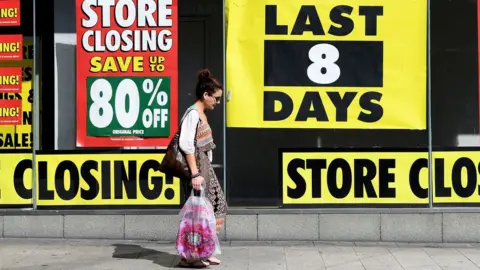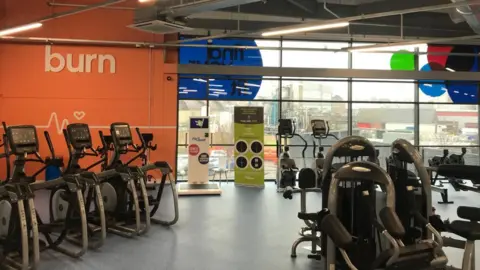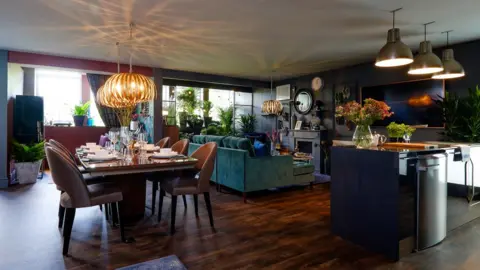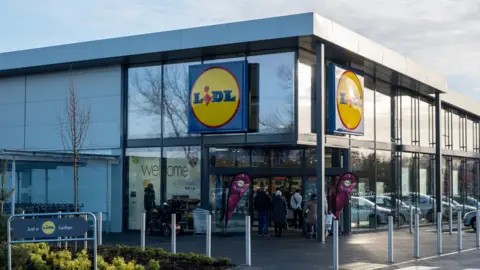Five things to do with empty retail space
 Getty Images
Getty ImagesSo far, 2018 has been a rough year on the High Street. Toys R Us and Maplin have collapsed, while New Look and Mothercare have announced closures, as have Jamie's Italian, burger chain Byron and Prezzo.
They're the latest victims of increased online shopping and higher overheads. The shift to online and more frequent food shopping also means some retailers have more store space than they need.
So what's happening to the space that's being freed up?
1. Gyms
 The Gym Group
The Gym Group Talk to anyone in retailing today and they'll tell you "experiences" are crucial - an effective way for bricks and mortar retailers to differentiate themselves from online.
Richard Lim, chief executive of Retail Economics, says experiences are about "what Amazon can't do".
Retailers need to create an interesting experience that "drives footfall and better loyalty and creates an environment that can't be replicated online", he adds. Gyms are a case in point and they've been busily snapping up empty retail space.
Low-cost operator The Gym Group has opened up in part of a former BHS in Walthamstow, north London. It's also rented excess space from Sainsbury's at its store at Murrayfield in Edinburgh.
Founder John Treharne says: "We have always converted retail space - there just happens to be more of it available today."
2. Crazy golf and climbing walls
And it's not just gyms getting in on the act. "Competitive socialising" is a big thing these days, says Colin Flinn, regional managing director of shopping centre owner intu, whose properties include Lakeside in Essex and the Trafford Centre in Manchester.
Ping-pong bars, trampoline parks, social darts, indoor golf, climbing walls, escape rooms and virtual reality games are all growing in popularity - and are on the hunt for suitable space.
 Swingers
SwingersThat can be empty space in shops. For instance, crazy golf operator Swingers has moved into the first floor of the former BHS flagship store on London's Oxford Street.
Co-founder Matt Grech-Smith says snapping up the site was as "no-brainer", because it's "literally a stone's throw from the ultra-high footfall of Oxford Circus. Sites in a location as prime as this don't come along very often - especially sites this big."
But the big and successful shopping centres are also attracting activities. "Major regional [shopping] centres are becoming 'resorts'," says intu's Mr Flinn. "Customers can either pop in to do a quick shop or spend a full day with the family."
3. Prosecco and patisserie
A key focus for retailers and shopping centres is turning themselves into "destinations" - persuading people to visit and stay for longer, rather than simply ordering stuff online.
Next's revamped store in Manchester's Arndale Centre includes a prosecco bar, a barber, a children's activity centre and, in the summer, a car showroom. It's also in talks with a spa operator.
A Next spokeswoman says the idea is to give "people a real reason to come to the store - people aren't browsing as much as they were before. Lots of things under one roof is far more appealing to a shopper."
Debenhams has also gone down this route. Boss Sergio Bucher says the focus of its strategy is leisure and "social shopping".
It's ramped up its food offering and the likes of Patisserie Valerie and Nandos are now in some stores.
It has also teamed up with gym operator Sweat, with the first gym due to open later this year, and taken a stake in beauty company Blow Ltd, which has opened salons in store.
"When people go shopping with friends, they tend to spend more," says a Debenhams spokesperson. "Destination is really important for all department store operators."
 John Lewis Partnership
John Lewis Partnership Recently, department store group John Lewis kitted out a fully furnished apartment in three of its stores. Customers could stay overnight and order dinner, while everything in the flat was for sale.
The department store group says customers are increasingly using its stores as a "leisure destination" and as a convenient place for click-and-collect.
"This means that our strategy in shops focuses much more on experiences and giving people a reason to come in and visit us," says a spokeswoman.
4. Houses and flats
In some instances, there may be no option but to admit the empty space is not going to work for retail or leisure, either in a town centre or in a worn-out shopping centre. That's when it's time to turn it into residential property.
"It makes sense, because we've got too many shops and a lack of flats." says Richard Lim of Retail Economics.
The British Property Federation's chief executive, Melanie Leech, agrees: "We think there's a huge opportunity from the empty retail outlets.
"We have a huge shortage of residential stock and we know people increasingly want to live in towns and cities."
5. Discounting and convenience
Of course, some retailers are still expanding and looking for new space. Leading the charge are discounters Aldi and Lidl, whose popularity is surging.
 Tony Kershaw
Tony KershawThe Institute of Grocery Distribution (IGD) reckons that by 2022, one of every £7 spent on groceries will go to the discounters, with the total value of their sales jumping by nearly 50% between 2017 and 2022 to about £30bn.
Lidl has more than 700 stores in the UK and plans to open 50 this year alone, while Aldi has more than 750 stores and will open 70 this year.
Convenience stores run by the big supermarket chains are also springing up in many neighbourhood locations as more and more people abandon the weekly shop and leave decisions about an evening meal to the last minute.
As a result, the IGD expects convenience store sales to rise by nearly 18% to about £47bn by 2022.
